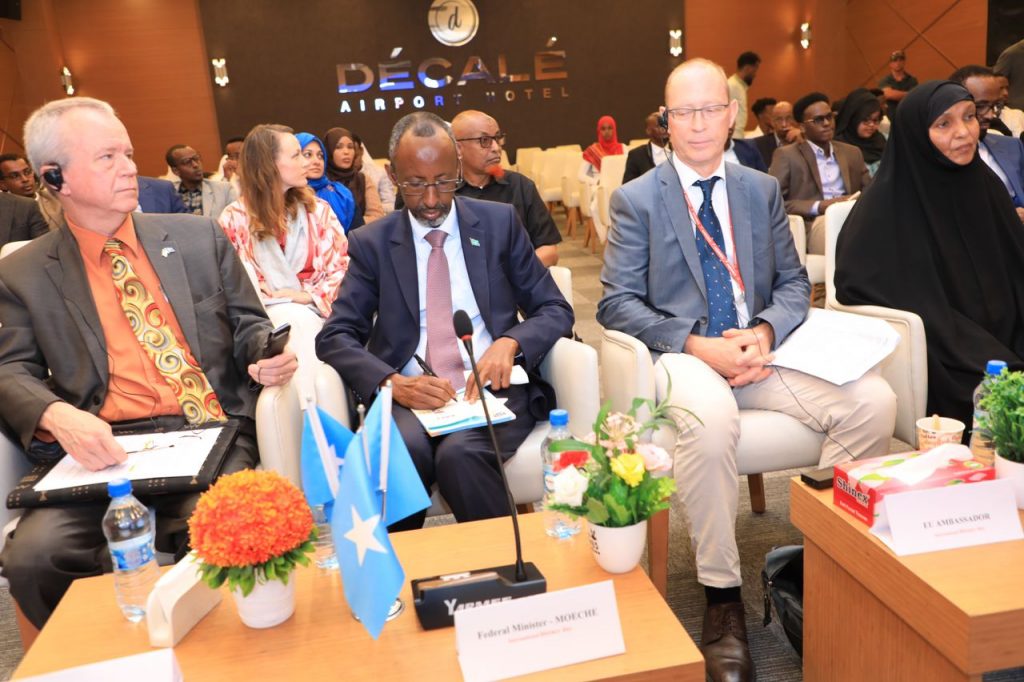NEWS RELEASE

FOR IMMEDIATE RELEASE
Mogadishu, Somalia September 8, 2022 ⎯ The Ministry of Education, Culture and Higher Education under the Bar ama Baro program for accelerated basic education is kicking off its second year of classes in Somalia on International Literacy Day. The USAID-funded program has enrolled 102,440 out-of-school children and youth children across 31 districts in South West, Hirshabelle, Jubaland and Banadir.
“International Literacy Day focuses worldwide solidarity on the fundamental importance of reading. Bar ama Baro is all about creating opportunities for young people – creating hope, drive, and spirit in young people and giving them the tools to raise their country up,” said Larry E. André, Jr, U.S. Ambassador to Somalia. “The American people are partners with the Federal Government of Somalia and the governments of the Federal Member States in achieving this revival with the Somali people. I know that this society is capable of rapid advancement in literacy. You have done it before.”
Bar ama Baro is implemented under the leadership of the Federal Government of Somalia’s Ministry of Education, Culture and Higher Education (MoECHE) in close collaboration with Federal Member States’ Ministries of Education (MoEs).
“Increasing access to education is a top strategic priority for the Government of Somalia, and International Literacy Day is a time to emphasize the importance of learning the foundational skill of reading,” said Minister Farah Sheikh Abdulkadir. “We value our partnership with USAID, which enables more Somali children to access quality education services.”
Roughly two-thirds of school-age children and youth in Somalia are not enrolled in school, making programs like Bar ama Baro critical to expanding literacy in the country. The program condenses a typical eight-year primary cycle into four years. This allows children between the ages of nine and 16 to catch up and either join the formal school system or obtain a primary school certificate through a nationally recognized examination process.
“There is a difference between yesterday and today for me and my sisters. Today we are students and we’re able to read and write,” said Zahra Mohamed, a 14-year-old Accelerated Basic Education student. “When I grow up I want to become a teacher and educate children from poor families.”
Bar ama Baro has trained around 2,700 teachers and headteachers at 460 schools in 31 districts. The program has also printed and distributed 772,000 copies of teaching and learning materials for students and teachers.
“Bar ama Baro is supporting the Government of Somalia to address the need of the large out-of-school population in the country,” said Faiza Hassan, Chief of Party. “Together we will continue to expand Somalia’s public education system so that every child has the opportunity to learn.”
Bar ama Baro takes its name from a beloved, nation-wide, civic service-oriented literacy campaign launched in the 1970s. Drawing on that rich legacy, this program’s combination of service delivery, policy support, and systems strengthening is supporting improved curriculum, increased capacity, extended outreach, and strengthened learning supports to overage and out-of-school children in Somalia.
International Literacy Day has been celebrated since 1967 to promote a more literate society and to serve as a reminder of literacy’s role in human rights. According to UNESCO, at least 771 million young people and adults worldwide lack basic literacy skills.
###

